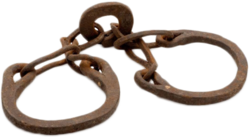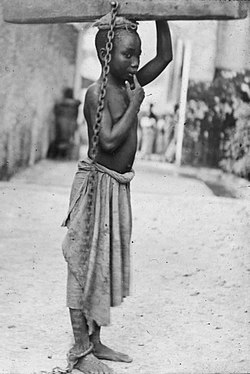
Back Slawerny Afrikaans Sklaverei ALS ባርነት Amharic Esclavitut AN Þēowdōm ANG عبودية Arabic عبودية ARY عبوديه ARZ Esclavitú AST T'aqisiyäwi Aymara
This article contains one or more duplicated citations. The reason given is: DuplicateReferences detected: (April 2025)
|
| Part of a series on |
| Forced labour and slavery |
|---|
 |
Slavery is the ownership of a person as property, especially in regards to their labour.[1] Slavery typically involves compulsory work, with the slave's location of work and residence dictated by the party that holds them in bondage. Enslavement is the placement of a person into slavery, and the person is called a slave or an enslaved person (see § Terminology).

Many historical cases of enslavement occurred as a result of breaking the law, becoming indebted, suffering a military defeat, or exploitation for cheaper labor; other forms of slavery were instituted along demographic lines such as race or sex. Slaves would be kept in bondage for life, or for a fixed period of time after which they would be granted freedom.[2] Although slavery is usually involuntary and involves coercion, there are also cases where people voluntarily enter into slavery to pay a debt or earn money due to poverty. In the course of human history, slavery was a typical feature of civilization,[3] and existed in most societies throughout history,[4][5] but it is now outlawed in most countries of the world, except as a punishment for a crime.[6][7]
In chattel slavery, the slave is legally rendered the personal property (chattel) of the slave owner. In economics, the term de facto slavery describes the conditions of unfree labour and forced labour that most slaves endure.[8]
The Islamic Republic of Mauritania was the last country in the world to officially ban slavery, in 1981,[9] with legal prosecution of slaveholders established in 2007.[10] However, in 2019, approximately 40 million people, of whom 26% were children, were still enslaved throughout the world despite slavery being illegal. In the modern world, more than 50% of slaves provide forced labour, usually in the factories and sweatshops of the private sector of a country's economy.[11] In industrialised countries, human trafficking is a modern variety of slavery; in non-industrialised countries, people in debt bondage are common,[8] others include captive domestic servants, people in forced marriages, and child soldiers.[12] Moreover, there have been many Islamic extremist groups and terrorist organizations who have periodically revived the practice of slavery based on their interpretation of Sha'ria law.[13]
- ^ Allain, Jean (2012). "The Legal Definition of Slavery into the Twenty-First Century". In Allain, Jean (ed.). The Legal Understanding of Slavery: From the Historical to the Contemporary. Oxford: Oxford University Press. pp. 199–219. ISBN 978-0-19-164535-8.
- ^ Baker-Kimmons, Leslie C. (2008). "Slavery". In Schaefer, Richard T. (ed.). Encyclopedia of Race, Ethnicity, and Society. Vol. 3. SAGE Publishing. p. 1234. ISBN 9781412926942.
- ^ Cite error: The named reference
Slaverywas invoked but never defined (see the help page). - ^ Pargas, Damian (2023). "Introduction: Historicizing and Spatializing Global Slavery". The Palgrave Handbook of Global Slavery throughout History. Palgrave MacMillan. ISBN 978-3031132629.
- ^ Engerman, Stanley; Paquette, Robert; Drescher, Seymour, eds. (2001). Slavery (Oxford Reader) (Reprinted ed.). Oxford University Press. p. 1. ISBN 9780192893024.
By the end of the twentieth century, slavery was no longer legally or morally acceptable anywhere in the world. Only two centuries ago, slavery was still among the most ubiquitous institutions in human societies, and had existed in most times and places throughout history.
- ^ Bales 2004, p. 4.
- ^ White, Shelley K.; White, Jonathan M.; Korgen, Kathleen Odell (2014). Sociologists in Action on Inequalities: Race, Class, Gender, and Sexuality. SAGE Publishing. p. 43. ISBN 978-1-4833-1147-0.
- ^ a b "Slavery in the 21st century". Newint.org. Archived from the original on May 27, 2010. Retrieved August 29, 2010.
- ^ Okeowo, Alexis (September 8, 2014). "Freedom Fighter: A slaving society and an abolitionist's crusade". The New Yorker. Archived from the original on January 6, 2018. Retrieved October 16, 2014.
- ^ Corrigan, Terence (September 6, 2007). "Mauritania: Country Made Slavery Illegal Last Month". South African Institute of International Affairs. The East African Standard. Archived from the original on August 4, 2011. Retrieved January 21, 2008.
- ^ Hodal, Kate (May 31, 2016). "One in 200 people is a slave. Why?". The Guardian. Archived from the original on April 30, 2019.
- ^ "Religion & Ethics – Modern slavery: Modern forms of slavery". BBC. January 30, 2007. Archived from the original on January 6, 2014. Retrieved June 16, 2009.
- ^ "ISIS and Their Use of Slavery". International Centre for Counter-Terrorism - ICCT. Retrieved August 30, 2024.
© MMXXIII Rich X Search. We shall prevail. All rights reserved. Rich X Search